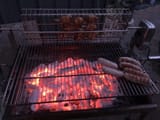Anonymous
6/20/2025, 7:11:21 AM No.16703052
Why does reactivity rise with temperature?
I was sitting by my grill and saw it rusting more where it gets very hot. I was thinking that "yeah - reactivity rises with heat". The parts made out of iron have reacted with oxygen in athmosphere.
Then i started to think why reactivity actually rise with temperature? The atoms have more velocity but they dont escape the surface. Is there some fancy quantum thing happening - where the tunneling distance propability rises with heat?
I was sitting by my grill and saw it rusting more where it gets very hot. I was thinking that "yeah - reactivity rises with heat". The parts made out of iron have reacted with oxygen in athmosphere.
Then i started to think why reactivity actually rise with temperature? The atoms have more velocity but they dont escape the surface. Is there some fancy quantum thing happening - where the tunneling distance propability rises with heat?
Replies:

